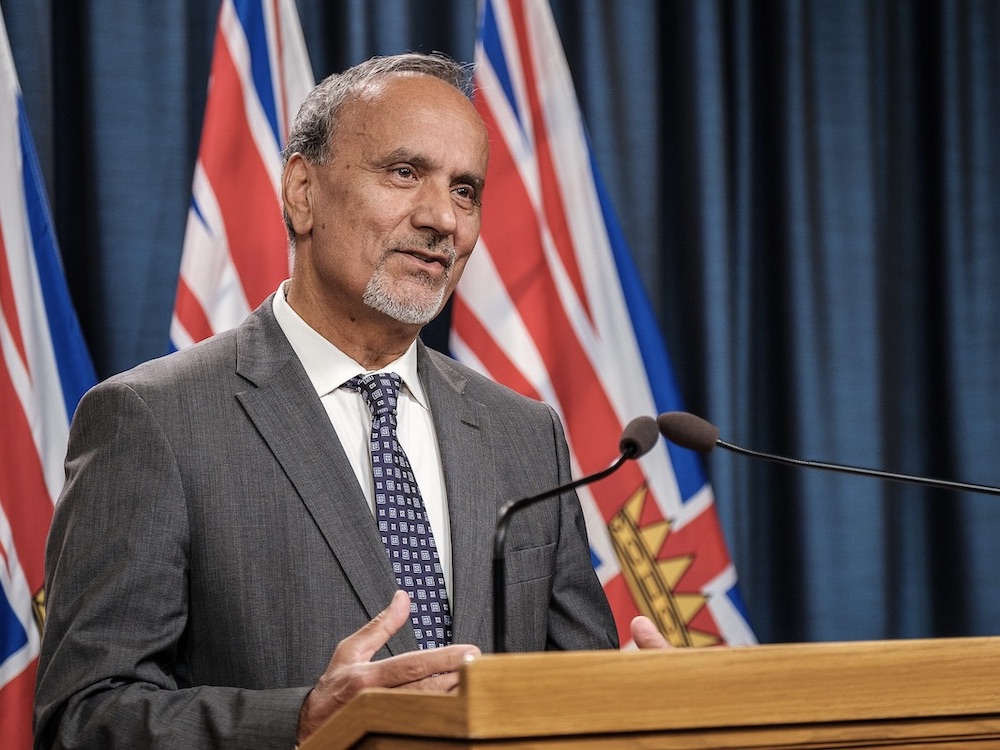British Columbia’s labour minister plans to soon pass new laws guaranteeing basic pay, rights and protections for tens of thousands of gig workers.
Harry Bains’s office has launched a call for proposals that could see new requirements placed on companies like Uber, DoorDash and Lyft, whose drivers and delivery workers work without minimum pay, sick leave or other basic benefits.
Bains says new legislation may come as soon as this fall, following years of government promises and months of consultations.
“The goal here is that these workers, like any other workers, they need basic protection when it comes to minimum wage, when it comes to health and safety, and how they are protected when they are injured at the workplace,” Bains said.
The particulars of how Bains accomplishes that will likely be a political and economic minefield for a provincial government trying to balance demands from organized labour and tech companies.
Academics, companies and labour advocates have all proposed widely different versions on how to improve working conditions in the sector — and, most vitally, on who should pay for it.
Uber, the largest of those companies, has promised retaliation against jurisdictions that have tried to impose new costs. Earlier this year, Minnesota Gov. Tim Walz vetoed a bill setting minimum pay standards for Uber drivers after that company threatened to pull service in most of the state.
Labour economist Jim Stanford said the fact the province is opening a second round of consultations indicates they are proceeding carefully.
“Because these deep-pocketed global companies have been allowed for years to operate in B.C. without oversight and appropriate accountability, they will now fight like hell to preserve the free pass they have been given on labour standards so far,” Stanford said in an email.
The BC NDP has promised to address the rising prevalence of gig work since 2017 and promised to develop a “precarious work and gig economy strategy” shortly after it was re-elected in 2020.
That has come slowly. The province held a series of meetings with drivers for those apps last fall and winter and collected more than 1,400 survey responses from the public, most of them from current or former drivers. They also had closed interviews with more than 20 stakeholders, including companies, labour organizations and academics like Stanford.
The results paint a stark picture of the reality of such work in B.C. More than half of workers who responded to the province’s survey said they relied on that income; for nearly 40 per cent, it was their only source of money.
Many complained they had no transparency on how they were paid and felt pressured to accept low-pay assignments. Workers say they can be removed from the apps without notice or pay. They also felt they could not refuse unsafe work.
Kuljeet Singh, an Uber driver in Metro Vancouver, has become part of a group of drivers who have demanded better pay and transparency from the company.
“Year by year, the fare is still the same. It never increases. But we don’t have any benefits from Uber,” said Singh in a previous interview with The Tyee.
A key point in the debate has become whether drivers like Singh should be considered contractors, employees or occupy some third category.
Currently, drivers for such apps in British Columbia are considered independent contractors. That means they are not guaranteed minimum pay. They also may not receive payment from WorkSafeBC if they are injured on the job.
The BC Federation of Labour has advocated for a test that would likely see most drivers classified as employees. That would require companies to pay towards WorkSafe BC coverage, pensions and other benefits just like other employers.
Companies, though, have argued making drivers employees would endanger the “flexible” nature of their work. DoorDash, a food delivery company, claimed in an email to The Tyee that most of its workers in B.C. had said they would stop working for the app if they could not choose their own hours.
Uber and the United Food and Commercial Workers union, or UFCW, have instead lobbied provinces asking for a separate, minimum list of standards for drivers, including pay set at 120 per cent of the minimum wage and the right to join a union.
The company and the union have argued that represents a workable, progressive compromise that allows companies to maintain their core business models while also opening the door to improving labour standards for drivers.
Records obtained via freedom of information request show many organizations have put their weight behind that proposal, including several with only tangential relationships to the gig economy.
The BC Restaurant and Foodservices Association, Mothers Against Drunk Driving Canada, the BC Tech Association and the Ending Violence Association of BC all penned very similar letters to the provincial government in support of the joint proposal from Uber and UFCW.
Some academics the province consulted are critical of such proposals. They say that creating a new “category” of worker opens the doors to other industries to whittle away at basic working standards.
“Once you get there, you start making exceptions. And it never stops,” said Mark Thompson, a professor emeritus of the Sauder School of Business at the University of British Columbia. Thompson has called on the provincial government for years to impose further regulations on app-based gig work.
“As a Canadian citizen, I fail to understand why a business should be permitted to operate while denying its workers the basic protections that virtually other worker has,” Thompson argues.
Another criticism of Uber and UFCW’s proposal is that its minimum pay standard would only apply to “engaged time” when a driver is actively on an assignment.
Bains said some drivers do work for multiple apps at a time. For example, someone who delivers food for Uber Eats may also do deliveries for DoorDash. App companies have argued this makes paying an hourly minimum wage outside of “engaged time” problematic.
“The uniqueness of the work, sometimes you are engaging in two or three apps to maximize their earnings. So who are they employees of, and who is the employer?” Bains said.
Stanford, though, argues that only paying for “engaged” time would set workers too far back. The Centre for Future Work, of which Stanford is the executive director, argued in its submission to the B.C. government that only paying for “engaged time” meant employees have no certainty on how much they can earn, even with a higher minimum wage.
Stanford argues part of the problem is that unlike other companies, there is no limit to how many people can drive for platform-based apps, meaning the cost of labour is constantly in fluctuation. And while the work hours may be “flexible,” Stanford said that is not helpful if workers are idling and going without pay.
He argued a better solution would be to implement a “true” minimum wage and then have companies restrict the number of drivers on the app at a given time, something that New York City has already done.
“This may be inconvenient for the companies, but results in a much more efficient operation in economic terms,” Stanford wrote.
Bains, for his part, has been tight-lipped about his own opinion on how to regulate this part of the gig economy.
In an interview with The Tyee, Bains suggested that it was not relevant whether or not workers were employees so long as they enjoyed certain minimum protections.
“We are looking to make sure these workers have basic, minimum protections, whether that is wages or whether that is health and safety. What you call them is academic, in my view, as long as they enjoy the same rights and protections, the transparency of pay, how they paid and how their pay is calculated,” Bains said.
When pressed on whether B.C. might see a new category of worker established, he said, “We’re not talking about creating a new category (of worker). Our goal is to make sure they have the same basic protection as all workers in B.C.”
The ministry’s consultation closes next month and Bains said he hopes to introduce new legislation in the coming fall or spring sessions.
“We want to do it as early as possible,” Bains said.
Stanford said he hoped the B.C. government would take a “strong, progressive approach to regulating gig work in a way that allows these companies to continue operating,” though he acknowledged it would likely be at a higher cost.
“Both the government, and labour advocates, will have to gear up for a big policy and political battle over those issues,” Stanford said. ![]()
Read more: Rights + Justice, Labour + Industry

















Tyee Commenting Guidelines
Comments that violate guidelines risk being deleted, and violations may result in a temporary or permanent user ban. Maintain the spirit of good conversation to stay in the discussion and be patient with moderators. Comments are reviewed regularly but not in real time.
Do:
Do not: